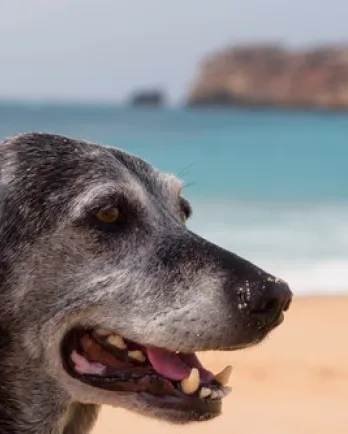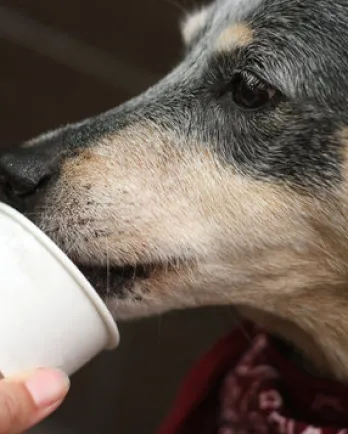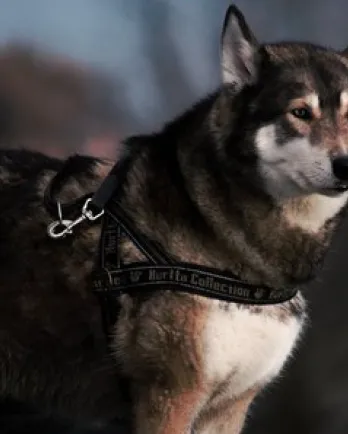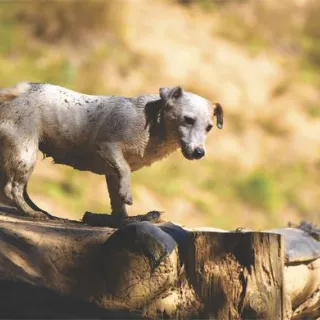Tips For Helping Your Senior Dog: 6 ways to help your dog in their golden years by Grant Withers
This article has been republished for exclusive use by The Grey Muzzle Organization with the permission of original author, Grant Withers.
As dogs grow old they can become hard to take care of and this alone can be a straining moment for anyone. As they get older they may face pain in joints due to arthritis, or memory loss from dementia. There are ways to help out our furry friends in these trying times and some of these can be as simple as pressing some buttons. With this blog I hope to teach you 5 tips for helping your elderly dog get through these hard times.
1. Temperature Control
Like I said it's as easy as pressing a button, oftentimes elderly dogs struggle in colder houses for many reasons. First their coat is thinning, this is natural and can lead to them being more exposed. Another reason is that the cooler temperature can stiffen their already painful joints. Some things you might take into consideration is how small or thin your dog is, where they spend their time if it is near a vent or window, and how thick their coat may be.
With all this in mind try to find your dog a warmer place to relax whether this is in sunlight or away from vents this will help their temperature. Another way may be to get a coat or jacket for your older friend to snuggle up in keeping them from getting to cold. Finally just make sure your thermostat is set to a reasonable temperature where your dog can be comfortable in their own home.
2. Food Consumption
As dogs get older their weight can become a larger issue than ever before, hurting their joints, and making moving a large task. Throughout a dogs life it is important to make sure your dog has a well balanced proper diet but this becomes even more impactful at older ages.
The first thing you will want to do is make an appointment with your veterinarian and make sure your dog is getting everything they need in their daily diet. You also should avoid anything your dog shouldn't need like that extra piece of bacon left over from breakfast. Feeding table scraps here and there may sound harmless, however it can really add up as well as reinforce bad behavior. This is the first step in getting your dog back to their healthy weight.
3. Supplements
Some dogs need additional vitamins and supplements to their normal diet, these can severely help older dogs just like they help human health. If a dog struggles to produce certain vitamins or fatty acids on their regulated diet additional supplements can be the solution. There are a numerous amount of supplements out there with tons of benefits for older dogs.
Before you give your dog anything it is always smart to consult your veterinarian to make sure a supplement or vitamin is right for your dog's dietary needs. Certain supplements can provide multi benefits such as Coconut oil for dogs. Coconut oil for dogs is known as a superfood that can help many different ailments including coat health, fighting off infection, and digestion. There are many other supplements and vitamins that can help your aging dog fill in holes of their diet.
4. Exercise
Along with all these dietary concerns the third key to their weight is exercise. A dog's diet is very important and can boost your dog's energy and playfulness, with this boost it is important to get easy non strenuous exercise in while you can. If your older dog loosens up those joints in an easy way it can help them feel better while helping lose weight.
When we talk about exercise it is not running your dog around the neighborhood, or having them jump for toys. All they need is maybe a slow game of fetch, a light tug of war game, or a nice walk around the block. These little things can add up to help your dog while giving them some fun that will get their mind off the pain.
5. Comfort
When dogs age they tend to need more sleep than before, because of this they need support that will not worsen conditions they may be facing. When dogs sleep on the ground it pushes on certain pressure spots creating problems for joints over time. And if they have a bed that is not supportive or has material not suited for long sleep schedules this can also hurt their quality of life giving them skin and joint problems.
There are plenty of dog beds out there and a lot seem to claim they are orthopedic, this is not always true. For the product to be a truly orthopedic dog bed, it needs to redistribute 100% of the pressure. This can only be achieved using visco elastic memory foam. When looking for a dog bed for an elderly dog you should look for a high quality orthopedic bed that uses real memory foam. You also may consider a fabric that will keep your dog clean and comfortable. As with other products make sure to research the company you are purchasing from to make sure the quality is what you are paying for. Truly orthopedic beds can be almost miraculous for a dogs joint pain and hip dysplasia due to their ability to cause less tension on pressure spots, and this could make a huge difference in your dog's comfort as they age.
6. CBD
CBD for dogs is a fairly new concept that is gaining some footing in the pet products industry. CBD which stands for cannabidiol is a compound derived from the hemp plant that when done properly contains no THC and is non psychoactive. Because of this it is 100% safe for dogs and has loads of medicinal purposes.
In older dogs CBD has been linked to helping joint pain, anxiety, reducing alzheimers and parkinsons, helping with seizures, and some claim that they even play a role in reducing cancer. Though all of these sound amazing some are still being tested and are not all backed scientifically. CBD has all the benefits of medicinal marijuana without the harmful psychoactives, making CBDs for older dogs super beneficial as they go through some of the pains that come with age.
If you would like to learn more about CBDs, check out the ultimate guide here.
Being the proud parent of an older dog is not easy, but can be an incredibly rewarding experience. We love our dogs and will do anything to make their lives better no matter the circumstance. My goal with this piece was to aid in the journey that is taking care of an elderly dog. Some of this advice may seem obvious, but they are important and worth reviewing as your dog grows older.
If this article helped you or you know someone that could use the info, please share it.
I am a writer for SitStay, your working dog headquarters since 1995. Since an early age I developed a love for animals and especially dogs!
I love writing about these furry little goofballs and hope to educate pet parents about anything and everything regarding their dogs.







